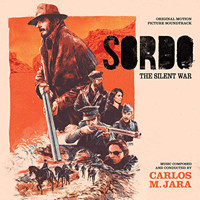- Composed by Carlos M. Jara
- MovieScore Media / 72m
Set in 1944, Sordo covers the events of a guerilla uprising against Spanish dictator General Franco. Directed by Alfonso Cortés-Cavanillas and starring Asier Etxeandia, most reviews describe the film as being like a Spanish western.
The score comes courtesy of Carlos M. Jara, who has previously worked as orchestrator for various Spanish composers including Lucas Vidal, as well as some solo projects as composer. It’s the first of his music that I’ve heard – but if it’s any indication of what he’s capable of then I certainly hope it won’t be the last.

The director mentions Ennio Morricone as an inspiration and as soon as you hear the opening track, that is clear – but it’s not the usual Morricone influence (i.e. the Sergio Leone scores). Instead the taut, aggressive opening piece brings to mind something like The Battle of Algiers with its arresting brass outbursts set against militaristic percussion. In fact this opening piece reminds me of a cross between that and the complex, rarely-imitated orchestral style of the great Alex North with its little musical clusters, crystal clear orchestration, and contrast between the sweet high winds and darker-than-dark brass dissonance and percussion.
“Rosa’s Theme”, the second piece, is more melodic of course – but far from lush. It very carefully avoids that, and has a raw power as a result of its delicacy. I absolutely love “The Bridge” where we hear an heroic take on the main theme – still nothing like contemporary film music’s version of heroic though, it’s like taking a trip back to when things were so much more complex and nuanced.
There’s certainly a clear Morricone influence in “The Bandit, the Horse and the Knight” as that main theme gets cast into an epic guise – now we are getting closer to the composer’s signature western sound (although sticking within a more traditional orchestral setting). Then in “Deaf in the Night” the same theme gets a very different treatment – gentle and introspective, very beautiful. There is no shortage of action music. “Hunting Rojas” is a fascinating track, relying on the percussion to give the piece its extraordinary driving momentum – but in such a raw, stripped-down way (perhaps an element of Morricone’s The Big Gundown to it). And the contrast between that and the piano-led, gentle “Rosa and Anselmo” which follows is a delight.
Another influence is introduced in “Darya”, with the demonic chanting bringing Wojciech Kilar’s classic Dracula to mind, but I don’t want to give the impression that this score is some sort of temp-track fest because it certainly isn’t – Jara brings his own spin on everything and it completely works as a unified whole.
An absolutely gorgeous theme is introduced in “Meeting”, first for winds and then solo trumpet – expansive, warm and full of emotion, it’s in contrast to what has gone before and all the more powerful as a result. There’s another stunner later on – “Caudillo”, led by strings this time, which is sadly so brief it seems to end before it really gets going. As we near the end of the album we get the most modern-sounding piece on it, “Luna Serena”, complete with guitars and an anthem-like choral presence. Following this the score ends with the sweetest version of Rosa’s theme, “Do Not Look, Rosa” which is just so lovely; then the album has a couple of source tracks to close it out.
It’s surprising but great to hear a score like this. Basically if you’re a fan of the more militaristic (rather than expansive) Morricone westerns, or for that matter of taut thriller scores by composers like Jerry Fielding in the 1970s, you’re in for a treat – this is a layered, complex and rewarding work which is highly recommended.
Rating: ****
facebook.com/moviewave | twitter.com/MovieWaveDotNet | amazon.com












It‘s quiet in here! Why not leave a response?